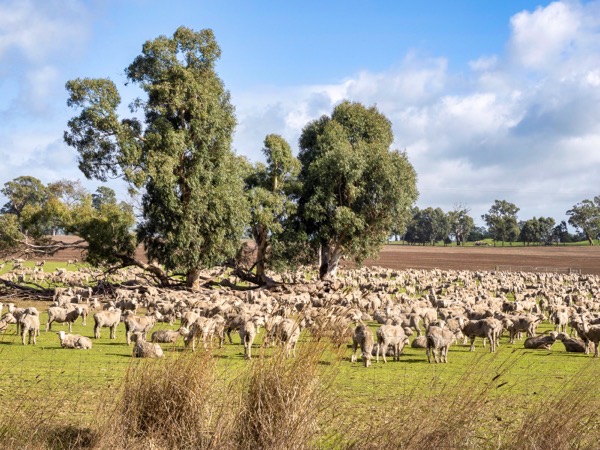
It was cool and rather windy as we left Stawell this morning, heading to Mount Gambier, just across the border into South Australia. Rather than a quick trip along the highway, we decided to travel on the back roads so that, as is our style, we could potter along and perhaps find some interesting things to see. Our route took us along the edge of the Western District of Victoria – a prime sheep and wheat farming area that produces some of the finest wool in the world.
These back roads first led us to Toolondo Reservoir. This was a new place for me. Toolondo Reservoir is an off-stream reservoir that is supplied from a very small catchment of its own via Mt Talbot Creek, but mostly from transferred water from the Rocklands Reservoir on the Glenelg River. . It stores a large quantity of inaccessible water known as ‘dead water’. It was built to increase supply of water for other nearby lakes.and has a high recreational value as a prime trout fishing location.

For the first part of the morning, the landscape was very flat with broad fields that had previously grown wheat and were now carrying thousands of sheep. They stretched for kilometres. These enormous paddocks were dotted with Red Gum trees that all had lots of character. Each tree had a small pile of branches underneath that had naturally fallen from its canopy. This behaviour gives them the reputation of being ‘Widow Makers’. You don’t want to camp anywhere near them!

By late morning and afternoon, the land had become undulating as we were now in an area of ancient volcanoes that created this topography hundreds of thousands years ago. We saw sheep properties along the way for most of the day. Many had quite significant shearing sheds.


We stopped in the town of Coleraine for a few minutes. We had stayed here on a trip during a break in the Covid period and stayed in a quaint little B&B called the Black Horse Inn in the Main Street. We noticed that is now closed and up for sale. On that trip, the South Australian border was closed to Victorians so we had to carefully avoided roads that would take us near the border.
The old railway station at Coleraine looks rather impressive, but it is a long time since any train has run through here. It now functions as the local tourist information centre.

Coleraine is one of the oldest country towns in Victoria with a history of settlement dating back almost 200 years. In fact, the local cricket club claims to be the second-oldest continuously playing cricket club in the world.
It was time for lunch by the time we reached the town of Casterton. As in any country town, the local bakery sold good pies, pasties and sausage rolls. The town’s claim to fame is that it is where the Kelpie Sheep dog was first bred. This breed of dog, bred for mustering sheep, is the mainstay of most sheep farms in Australia.

The surveyor and explorer Major Thomas Mitchell passed through this area during his Australia Felix expedition of 1836. His reports of good pasturage encouraged the Henty Brothers to move inland in 1837, marking the start of European settlement in the Western district. They took up 28,000 hectares (108 sq miles) of land in the area.
One of my favourite references sources, aussietown.com.au reports that by 1857 a local pastoralist observed of the local Aborigines that “The tribe is nearly extinct” and that alcoholism had spread through the community as the traditional culture collapsed.
The railway arrived in 1884 and Casterton then became the most western terminus of the state’s rail service. It closed in 1977.

The town thrived in its early years and by 900 it had five hotels, five butchers, eleven general storekeepers, two tinsmiths, seven blacksmiths and wheelwrights, three banks, four tailors, three drapers and milliners, six auctioneers and agents and a pharmacy. I think there are still five pubs in the Main Street!
Mount Gambier was only about 65 kilometres further on and we arrived in the early afternoon, helped by a silly 30 minute time zone difference between South Australia and Victoria.



Great photos and excellent narrative as usual.